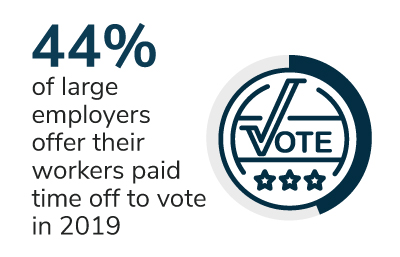February 04, 2020
Breaking News
Many large employers have announced new and expanded commitments to support voter turnout in the 2020 election and beyond. Concerns about voting on Election Day—from the COVID-19 pandemic to long voting lines—is influencing their approach. Some employer members are encouraging early voting (where applicable) and allowing employees to use paid time to vote on or before November 3, rather than only offering time to vote on Election Day. Employers are also administering campaigns to encourage employees to register to vote.
Large employers demonstrate a commitment to our most important civic duty and align their corporate brands with customer values when they give employees time to vote.
- 1 | 1 in 7 nonvoters in the 2016 general election didn’t vote because they were too busy or had a schedule conflict.1
- 2 | 70% of Americans agree that high voter turnout is very important in presidential elections.2
- 3 | 79% of consumers believe companies should take action on political and social issues.3
- 4 | 87% of consumers believe companies have the power to influence change.3

Business Case for a Voter-friendly Workplace


Giving Time to Vote
There are a variety of ways to provide employees with time to vote, from offering flexible work arrangements or voter leave to designating Election Day a holiday. The right practice for your company will be unique to the needs and priorities of your employees, customers and shareholders, in addition to adhering to legal requirements.
- Flexible Work Arrangements: Allow employees to adjust their work hours to come in late or leave early while still working the same number of hours, extend the opportunity to telework (polling locations are often closer to home) and/or designate Election Day as a “no meeting” day to reduce the risk of schedule conflicts.
- Voter Leave: Offer paid or unpaid time to vote.
- Business Closure: Shorten business hours by opening late, closing early or designating Election Day as a holiday and closing for business. If you designate Election Day as a holiday, you have the option to either create a new holiday or swap for another one.
If you offer employees a full day of leave or designate Election Day as a holiday, encourage employees to use the day for voting, civic engagement or other volunteer activities, especially in states that offer early voting.

Get C-Suite Support and Start Early
According to Harvard Kennedy School, CEO and staff support are critical to implementing initiatives related to voting, while money is not. Because these efforts often require the time of current employees, early planning is important and makes for easier implementation.8
Other Opportunities to Encourage Voting
- Communicate relevant election information, such as how to register to vote and important dates, through emails, instant messages, all-hands meetings and signage.
- Host in-person voter registration drives.
- Provide on-site resources for mail-in ballots or early voting.
- Promote voter participation through social media channels.
IMPORTANT NOTE: Don’t tell your employees whom to support or vote for in an election, force employees to vote or make voting a factor in performance reviews
Employers in Action
Hundreds of U.S. companies encourage employees and customers to vote. Here are a few examples of how employers are taking action:
- Blue Cross and Blue Shield of Minnesota has been administering their CitizenBlue program for 18 years; in 2018, each employee received a magnet with key dates leading up the election; the company also hosted bipartisan candidate forums during lunch, developed a website with key election information and provided a summary of on what different state officers do.8
- Cava, a fast-casual restaurant chain, gives hourly employees two hours of paid leave to vote on election day; employees provide their managers with two weeks notice that they want the time off to vote, so shifts can be arranged appropriately.9
- Levi Strauss & Co. gives employees, including retail workers, paid time off to vote (retail employees receive three hours to vote and all other employees receive five hours); Levi also has volunteer “voting captains” in each location who hold registration drives and provide employees with key voting information.10, 11
- Patagonia closes all retail stores, distribution and customer service centers and headquarters and gives all employee paid time off to vote.12
- facebook is offering employees up to eight hours of paid time for the November 2020 election and also includes PTO for training ahead of Election Day for those who want to participate as poll workers.13
- The Coca-Cola Company is making Election Day a paid holiday for all U.S.-based employees.13
More Topics
Articles & Guides- 1 | U.S. Census Bureau. September 2018. Characteristics of voters in the presidential election of 2016. https://www.census.gov/content/dam/Census/library/publications/2018/demo/P20-582.pdf.
- 2 | Pew Research Center. April 2018. Elections in the U.S.: Priorities and performance. http://www.people-press.org/2018/04/26/3-elections-in-the-u-s-priorities-and-performance/.
- 3 | Global Strategy Group. 2019. Doing business in an activist world: 6th annual business & politics study. https://www.globalstrategygroup.com/wp-content/uploads/2019/02/GSG-2019_Doing-Business-in-an-Activist-World_Business-and-Politics.pdf.
- 4 | Borysenko K. November 2018. Why you should give employees time off to vote. https://www.forbes.com/sites/karlynborysenko/2018/11/05/why-you-should-give-employees-time-off-to-vote/#7940e5a47905.
- 5 | Guerin L. Taking time off to vote. NOLO. 2019. https://www.nolo.com/legal-encyclopedia/taking-time-off-voting-jury-29708.html.
- 6 | https://www.businessinsider.com/can-i-leave-work-early-to-vote-2016-11.
- 7 | https://www.maketimetovote.org/participants.
- 8 | Gross, S. Spillane, A. 2019. Civic responsibility: The power of companies to increase vote turnout. https://ash.harvard.edu/files/ash/files/harvard-casestudy-report-digital_copy.pdf.
- 9 | Sidman, J. Cava will gives it’s 1,600 employees paid leave to vote on election day. October 2018. https://www.washingtonian.com/2018/10/22/cava-will-give-its-1600-employees-paid-leave-to-vote-on-election-day/.
- 10 | McGregor, J. How employers are trying to drive Election Day turnout. October 2018. https://www.washingtonpost.com/business/2018/10/22/how-employers-are-trying-drive-election-day-turnout/.
- 11| Gelles, D. September 2018. Walmart, Patagonia and Lyft make push to increase voter turnout. https://www.nytimes.com/2018/09/23/business/time-to-vote-patagonia-walmart-lyft.html.
- 12 | Marcario R. Let our people go vote. June 2018. https://www.linkedin.com/pulse/let-our-people-go-vote-rose-marcario/.
- 13 | Robinson-Jacobs, K. September 2020. Major companies giving paid time off to vote: Verizon joins the list. https://www.forbes.com/sites/karenrobinsonjacobs/2020/09/11/major-companies-giving-paid-time-off-to-vote-facebook-joins-the-list/#4e1e28cf2f88.
This content is for members only. Already a member?
Login
![]()
